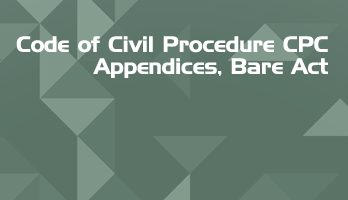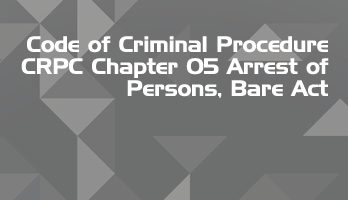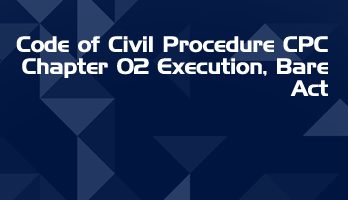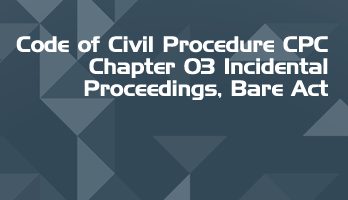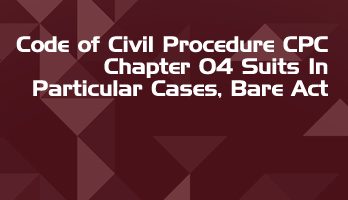A 'Bare act' is the actual legislation passed by the Parliament of India. Generally, an act sets out the high level legal and policy principles applicable to the subject matter of the law.
Most acts are accompanied by 'subsidiary legislation' such as rules, regulations, notifications and orders; which address the actual implementation detail of the act.
Free Full Course Available on LawMint's YouTube Channel
How to Land Your Dream LLB Internship in a Top Law Firm
- Part 1 - Introduction
- Part 2 - Internship Planning
- Part 3 - Internship Research
- Part 4 - Building Your Profile
- Part 5 - The Email
- Part 6 - The Resume
- Part 7 - The Cover Letter
- Part 8 - The Interview
- Part 9 - Self Development
Practical and comprehensive course, with real examples and step-by-step analysis of the complete internship application process. Check out LawMint's YouTube channel now!
Indian Penal Code, 1860
Chapter IX – Of Offences by or Relating to Public Servants
Section 161 – (Repealed)
Rep. by the Prevention of Corruption Act, 1988 (49 of 1988), s. 31.
Section 162 – (Repealed)
Rep. by the Prevention of Corruption Act, 1988 (49 of 1988), s. 31.
Section 163 – (Repealed)
Rep. by the Prevention of Corruption Act, 1988 (49 of 1988), s. 31.
Section 164 – (Repealed)
Rep. by the Prevention of Corruption Act, 1988 (49 of 1988), s. 31.
Section 165 – (Repealed)
Rep. by the Prevention of Corruption Act, 1988 (49 of 1988), s. 31.
Section 165A – (Repealed)
Rep. by the Prevention of Corruption Act, 1988 (49 of 1988), s. 31.
Section 166 – Public servant disobeying law, with intent to cause injury to any person
Whoever, being a public servant, knowingly disobeys any direction of the law as to the way in which he is to conduct himself as such public servant, intending to cause, or knowing it to be likely that he will, by such disobedience, cause injury to any person, shall be punished with simple imprisonment for a term which may extend to one year, or with fine, or with both.
Illustration
- A, being an officer directed by law to take property in execution, in order to satisfy a decree pronounced in Z – favour by a Court of Justice, knowingly disobeys that direction of law, with the knowledge that he is likely thereby to cause injury to Z. A has committed the offence defined in this section.
Section 166A – Public Servant disobeying direction under Law
Whoever, being a public servant –
- knowingly disobeys any direction of the law which prohibits him from requiring the attendance at any place of any person for the purpose of investigation into an offence or any other, or
- knowingly disobeys, to the prejudice of any person, any other direction of the law regulating the manner in which he shall conduct such investigation, or
- fails to record any information given to him under sub – section (1) of section 154 of the Code of Criminal Procedure, 1973, in relation to cognizable offence punishable under section 326A, section 326B, section 354, section 354B, section 370, section 370A, section 376, section 376A, section 376B, section 376C, section 376D, section 376E or section 509,
shall be punished with rigorous imprisonment for a term which shall not be less than six months but which may extend to two years, and shall also be liable to fine.
1 Criminal Law (Amendment) Act, 2013
Section 166B – Punishment for non – treatment of victim
Whoever, being in charge of a hospital, public or private, whether run by the Central Government, the State Government, local bodies or any other person, contravenes the provisions of section 357C of the Code of Criminal Procedure, 1973, shall be punished with imprisonment for a term which may extend to one year or with fine or with both.
1 Criminal Law (Amendment) Act, 2013
Section 167 – Public servant framing an incorrect document with intent to cause injury
Whoever, being a public servant, and being, as such public servant, charged with the preparation or translation of any document or electronic record, frames or translates that document or electronic record in a manner which he knows or believes to be incorrect, intending thereby to cause or knowing it to be likely that he may thereby cause injury to any person, shall be punished with imprisonment of either description for a term which may extend to three years, or with fine, or with both.
Section 168 – Public servant unlawfully engaging in trade
Whoever, being a public servant, and being legally bound as such public servant not to engages in trade, engages in trade, shall be punished with simple imprisonment for a term which may extend to one year, or with fine, or with both.
Section 169 – Public servant unlawfully buying or bidding for property
Whoever, being a public servant, and being legally bound as such public servant, not to purchase or bid for certain property, purchases or bids for that property, either in his own name or in the name of another, or jointly, or in shares with others, shall be punished with simple imprisonment for a term which may extend to two years, or with fine, or with both; and the property, if purchased, shall be confiscated.
Section 170 – Personating a public servant
Whoever pretends to hold any particular office as public servant, knowing that he does not hold such office or falsely personates any other person holding such office, and in such assumed character does or attempts to do any act under colour of such office, shall be punished with imprisonment of either description for a term which may extend to two years, or with fine, or with both.
Section 171 – Wearing garb or carrying token used by public servant with fraudulent intent
Whoever, not belonging to a certain class of public servants, wears any garb or carries any token resembling any garb or token used by that class of public servants, with the intention that it may be believed, or with the knowledge that it is likely to be believed, that he belongs to that class of public servants, shall be punished with imprisonment of either description, for a term which may extend to three months, or with fine which may extend to two hundred rupees, or with both.
Important Central Acts in Regional Languages
Legislative department website also features regional language versions of several important Central Acts.
Free Full Course Available on LawMint's YouTube Channel
How to Land Your Dream LLB Internship in a Top Law Firm
- Part 1 - Introduction
- Part 2 - Internship Planning
- Part 3 - Internship Research
- Part 4 - Building Your Profile
- Part 5 - The Email
- Part 6 - The Resume
- Part 7 - The Cover Letter
- Part 8 - The Interview
- Part 9 - Self Development
Practical and comprehensive course, with real examples and step-by-step analysis of the complete internship application process. Check out LawMint's YouTube channel now!





